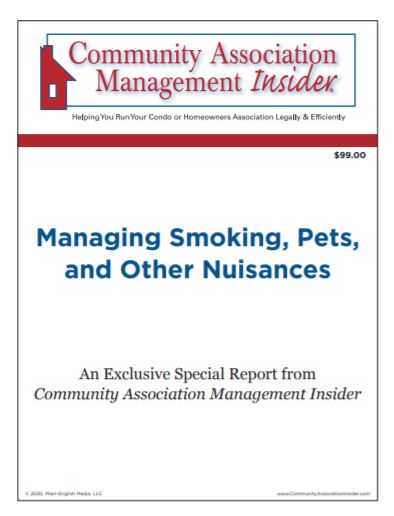Do’s & Don’ts
Managing Smoking, Pets, and Other Nuisances

Regardless of where you’re located, or how long you’ve been in the business, the same types of problems tend to crop up over and over, don’t they?
It’s not the big emergencies that make you pull your hair out, but the everyday hassles that start to grate when you get lots of people living together in the same community. Things like pet issues. And smoking. And the other chronic niggling nuisances that, over time, become a real pain in the neck.
Which is why we’ve pulled together this Special Report specifically about managing these sorts of challenges.
Download now »Associations and Management Companies Aren’t Immune from Cyber Crime
Online Owner Payments, Part 2: Choosing the Right Path
Spring Has Sprung: 5 Tips for Handling Looming Landscaping Issues
Don’t Fire Staff Before Investigating Complaint
Unfortunately, you might encounter a situation where a member of the community association you manage complains about a maintenance or other type of worker who is left alone with the member. But what if it isn’t clear exactly what the employee may have done wrong? Sometimes, an interaction might be described in general terms as “creepy” or as having made the member feel “scared.” But if the member didn’t say anything specific that the worker did that was inappropriate and you’ve never had any complaints before, you should tread lightly.
Avoid Fair Housing Violations When Enforcing Community Rules
There are some common fair housing problems that can arise from community rules. But you can avoid them if you understand where you might go wrong. In general, community rules trigger fair housing problems in one of two ways—either the rules are enforced unfairly or the rules themselves are unfair.
Don’t Allow Staff to Work on Elevators
It’s smart for associations to have a continuing maintenance and repair contract with an elevator contractor. Elevator issues can turn deadly so experts in that field are invaluable, and can help you avoid liability for you and your staff. But don’t let your staff do any work on your community’s elevators, except for routine cleaning and light bulb replacement.
Ensure Board Members Don’t Exceed Term
Although board member positions are voluntary, many members take them seriously—and personally. That could create controversy. That’s because, sometimes, to comply with the law, association boards must be restructured; if you find yourself in the position of having to deliver the news and help with the restructure, you could be faced with accusations by board members that you’re improperly trying to oust them for your own motives.
Use Authority to Add Community-Wide Amenity
Internet access is now a must-have for most people, including the members in your community. But as ubiquitous as the Internet is these days, some communities still require members to arrange for and pay for Internet access in their own units. If your association has decided that it wants to provide wireless connectivity (Wi-Fi) to the entire community, you’ll have to find a way to pay for it, most likely by adding the cost to the monthly assessment.
Don’t Grant ‘Unreasonable’ Accommodation Requests
If a member comes to the management office requesting an accessible parking space because he’s disabled, and you see no obvious signs of disability, like use of a mobility device, you might have to ask for the appropriate documentation to support the request, such as a government-issued license plate. But beware of members who ask for more than they need—for example, a member who asks you to reserve an entire section of the parking lot for his exclusive use, rather than one spot.
